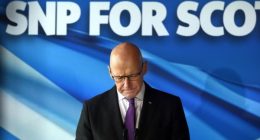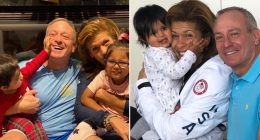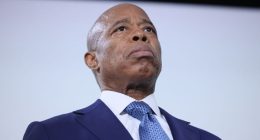
Denise Gough took it as a sign.
The Irish actor had just found out that the pilot for Bloodmoon, the Game of Thrones spinoff set 8,000 years before the original series, in which Gough starred alongside Naomi Watts, had been canceled. The show they had made would never be seen. HBO, going back to the drawing board, would eventually return with that other GOT series, House of the Dragon.
For Gough, it looked like fate. After successful excursions into video game voiceovers — Mass Effect: Andromeda, The Witcher 3 — film (Julia, Naked, Colette) and TV (Guerrilla, Paula) — she decided to return to her first love, theater.
“At that moment I thought: Ok, alright; obviously my fate is not to work on that sort of thing,” Gough said, speaking to The Hollywood Reporter at the recent Lucca Comics and Games convention. “I wanted to return to theater, to my job. But right then I got a call; they told me: ‘Tony Gilroy wants to meet you.’ Honestly, though, I had no idea who Tony Gilroy was. I only knew we were talking about Star Wars. I Googled him, and only then I understood how serious it was.”
Like, Andor serious. That meeting led to Gough being cast as Dedra Meero, a chillingly efficient lieutenant and supervisor of the Empire’s Imperial Security Bureau in the new, critically-acclaimed Disney+ Star Wars series, a prequel to Rogue One. Ahead of the last episode of the first season, which drops on Wednesday, Gough spoke to THR about moving from fantasy to sci-fi, why her character Meero isn’t afraid “to go fascist,” and the experience of making a series that no one will ever see.
What was your first meeting with Tony Gilroy like?
We talked. But since I already had a show ready and, given my previous experience with a big franchise, I initially wasn’t convinced. When Tony sent me the first three screenplays, though, something changed. What I’ve always liked about Tony is his attitude. He never beats around the bush. We both knew the topic, Star Wars, and we were able to talk without any issue. My character doesn’t appear in the first scripts. She appears later on. But the writing was truly incredible, and I immediately understood that I was witnessing something entirely different than what I expected.
How so?
Not everything comes down to the size of a role or the number of scenes; sometimes, and I mean it, the writing is enough. It’s enough to read something good, something truly absorbing, in order to say yes. I love sci-fi. More than that: I love the very idea of sci-fi. But usually this type of series doesn’t offer the best or most satisfying roles or characters. But Andor is exactly my thing.
Compared to other series, Andor takes a political and contemporary approach. Is this what intrigued you?
Tony and the other writers have written a story that’s only incidentally a Star Wars series. In some ways, it’s something else — more mature, complex and tense. I’ve often thought that for my 7-year-old nephew watching Andor couldn’t have been very easy. Then, they made a Lego version of me, and everything was okay. Jokes aside: that I am able to say these things, to say them so honestly, it’s a wonderful thing for me.
Was your career in theater useful for this role?
Without a doubt. The language in Andor is very specific and technical. And on the first day I had some trouble. I had to prepare myself the way I do with pieces that require a more robust, almost muscular, language. I’m thinking, for example, of the scenes with Anton Lesser [who plays Major Partagaz]. And that’s why I love this role so much. I feel like I’m working on a play. On TV. I usually have to adapt, but with this Star Wars series I can use all I know and I got from theater. On top of that, thanks to Andor, I can act alongside some of the best theater actors around.
Genre is often just an excuse to talk about broader topics. What is the main theme in Andor?
That life is full of shades, grays, and people are never fully good or evil. And that’s only the most superficial, immediate, aspect of the writing in Andor. There are also other themes. Take a look at my character: she’s a woman who finds herself surrounded by men, men who are often completely useless. But it’s not all a matter of gender. Andor shows a woman who can be corrupt as much as a man and highlights the effect that power may have on anyone.
What type of person is your character, Dedra Meero?
She’s incredibly ambitious, but that doesn’t mean she wants to be at the top of the Empire. And she wants everything to be done properly. During interrogations, she’s meticulous and careful, something which many of her colleagues are not. In her mind, she’s convinced she must save the Galaxy and therefore sees herself as a heroine. And that’s terrifying, if you think about it. Because she’s ready to do anything to succeed and she isn’t scared to go for a fascist approach. In a way, she’s similar to [Diego Luna’s character] Cassian. But in a completely different way.
Can we talk about the Game of Thrones spinoff you were a part of?
Sure.
What can you tell us?
Nothing. Absolutely nothing. (Laughs.)
What was the experience like?
It was wonderful, without a doubt; I was able to work alongside some incredible people. In the end, though, things did not go well. And the point is that this kind of thing happens all the time. Perhaps people think that, this being Game of Thrones, the news of its cancellation are devastating.
It wasn’t?
For me, everything happens for a reason and everything happens the way it’s supposed to. When our pilot episode wasn’t chosen, when the production didn’t go forward, I didn’t feel devastated. Because, obviously, it wasn’t destined to happen. So, I went back home, to the theater, and then I was contacted by, if possible, an even bigger franchise. I found a role that is closer to those I usually play.
And the channel has gone on to produce another GOT series that, from what I’ve heard, did pretty well. So, the decision taken was the right one. I don’t wish to take over the role of someone who clearly knows better than me what works and what doesn’t.
But you must have an idea for a story that works, that you want to tell.
Sometimes I feel as though I’m not looking for the stories I want to tell but rather, somehow, it’s those stories that find me. The stories I want to tell are whole, they have depth. I am not interested in superficiality. I want to work with good actors and good writers. I’ve never worked on a TV series where I’ve had to ask for changes.
The scripts I’ve worked with have always been definitive and complete. Here, in Andor, I’ve only ever asked to change one line. I was supposed to say I “have had it” which is American English. I suggested changing it to “get on with it,” which is British English and fit in better with the rhythm and musicality of the dialogue. In the end, that’s all I’m looking for: good writing.
Source: Hollywood








